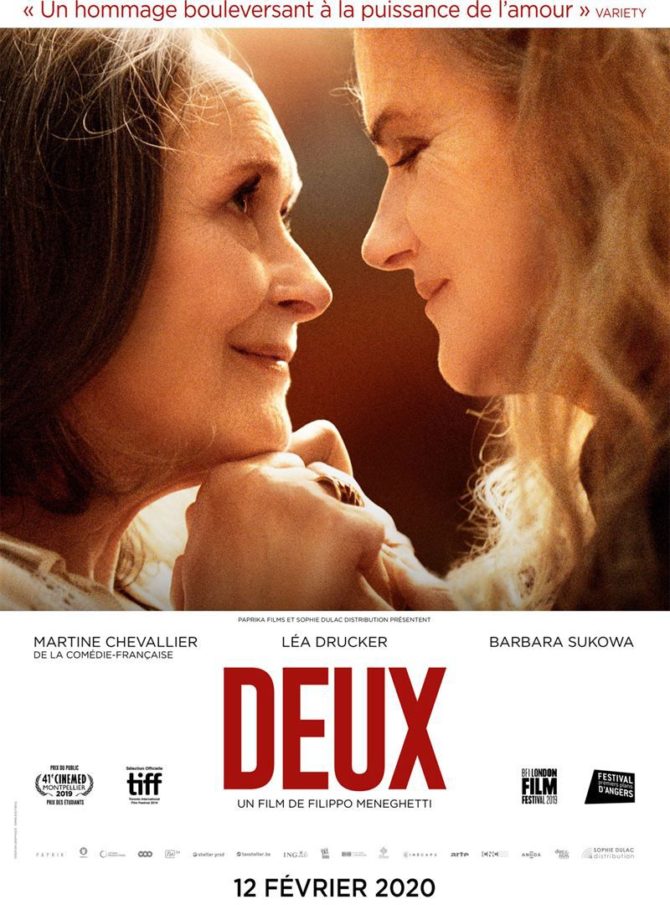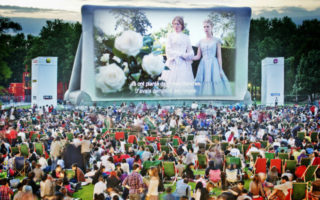Film Review: Deux (The Two Of Us) Directed by Filippo Meneghetti
- SUBSCRIBE
- ALREADY SUBSCRIBED?
BECOME A BONJOUR PARIS MEMBER
Gain full access to our collection of over 5,000 articles and bring the City of Light into your life. Just 60 USD per year.
Find out why you should become a member here.
Sign in
Fill in your credentials below.
Deux is translated as The Two of Us, however the most important point of Filippo Meneghetti’s remarkable but flawed film is that relationships inevitably involve more than just two persons. Madeleine and Nina make an arresting couple: two aging women, one French, the other German. Even at an advanced age they’re not only affectionate and comfortable with one another, but also passionate. They live across the landing from each other, which seems convenient but odd—why not together?
In any case, they’re planning to move to Rome, a post-retirement idyll. In the run-up to the big move, they prepare to sell their flats, with Madeleine taking the initiative, having a real estate broker assess her home (Nina’s place is roughly the same, though she asks the broker to visit as well). Everything is set for this couple who seem to have been living the romantic life together for years. The director photographs the two lovingly, expressing a sense of intimacy rather than voyeurism or daring.
The light in Deux is often tinted yellow or yellow-orange, to complex effect. It evokes autumn, the advanced phase of the women’s lives, also cozy intimacy. But it also suggests the claustrophobic nature of two people so emotionally entwined. Meneghetti often trains his camera on objects in an overly fixed way, or at a slightly skewed angle, indicating something awry, not quite stable, about such strong feeling. It may have to do with the way outside pressures distort those feelings.
Martine Chevallier convincingly expresses both Madeleine’s loving nature and her numerous hesitations—which come from her concern for those she loves. That means especially her grown children, a son and daughter, and a grandson with whom she’s very close. It also includes someone who’s no longer there: her late husband—or ex-husband. When Madeleine became involved with Nina it led to the dissolution of her marriage (the children don’t know why—we wonder, did the husband?). Eventually he died—which Madeleine’s son hasn’t come to terms with, except to resent his mother.
There’s a strange running motif in the film, sequences shot along a bucolic river bank. It’s not always clear whether the shots are memory or dream, or real time. Something seems to have happened there, by the river. Perhaps relating to the death of the husband? We occasionally glimpse something in the water. It’s a disturbing conceit, but an intriguing one. Another technique the director uses is to exaggerate the noise level of certain sounds. Even banal sounds like a hair blower, rustling leaves, or a washing machine take on an invasive screeching quality that brings a sense of menace. This technique may be out of David Lynch, but it’s an appropriate expression of tense emotions that risk blowing up.
If the jarring techniques seem to represent for Madeleine some disturbance coming from the outer world, in the case of Nina they may refer to disturbances coming from within. Nina is superbly played by the great German actress Barbara Sukowa, who brings out her obsessive love and feral determination, and emerges as the film’s star. Nina had been a tour guide in the past, which is how she met Madeleine, and afterwards they’d arranged to meet on other trips—or had Nina alone arranged it? Was moving across the landing a consensual thing, or her decision? After Madeleine falls seriously ill Nina takes pains to care for her. We sympathize, but also have doubts—her dedication sometimes resembles that of a stalker.
Madeleine’s family is the elephant outside the room. One obvious reason for Nina’s behaviour is that aside from Madeleine, she’s alone in the world. The family is a rival that she appeals to but also lashes out against. For Madeleine, her family is an emotional outlet but also a heavy weight. The most complex member of the family is her daughter Anne (Léa Drucker). She’s a conciliator, loving daughter, carer for her mother, and is friendly (at first) to Nina. But when she discovers the truth of the relationship between the two women she reacts with shock, and enmity towards Nina, setting up the central psychodrama.
The director misses an opportunity to show how a discovery about a loved one can turn the past—a whole lifetime—inside out. In a positive sense, this may force people to call all their old values into question and move in a new direction. We get a hint of this with the scene of Anne’s discovery of old photos of her mother and Nina (which for some reason is awkwardly shot).
Instead, the director ramps up the Fatal Attraction/Basic Instinct intensity. Whether he realizes it or not, he’s also indulging in an old-fashioned view of gay relationship stories: as in The Little Foxes or The Killing of Sister George (both adapted from stage plays), the complexity of relationships is resolved into the lurid complexes of melodrama. There’s a scene at the end of the film of the two protagonists dancing, alone, without any music. It’s moving, but so often in life it takes more than just two to tango.
Production: Paprika Films/Tarantula Luxembourg/Artemis Films
Ditribution: Doc & Film International/Sophie Dulac




